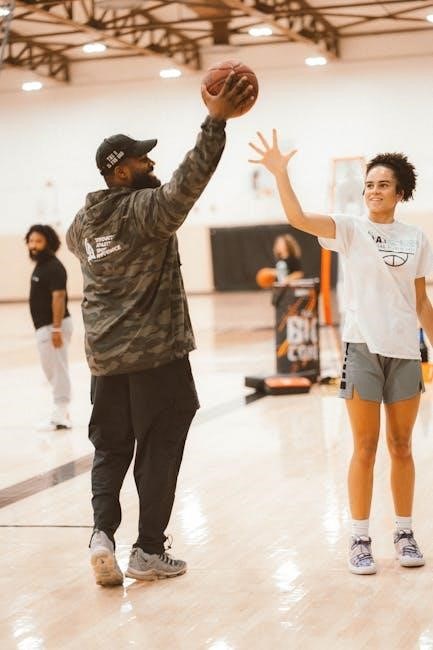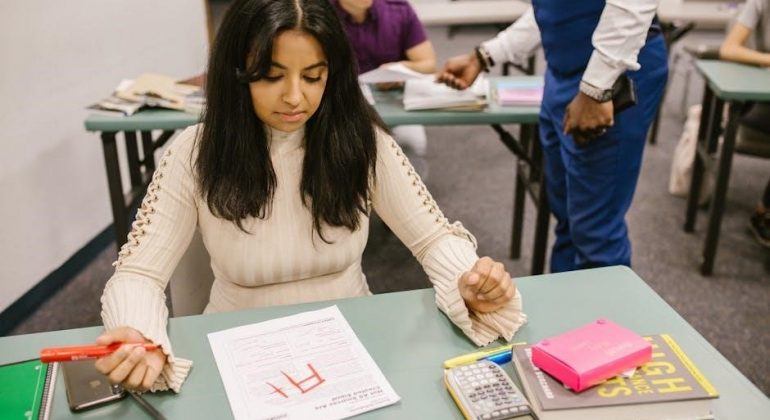Welcome to our guide on Iowa Test practice for 2nd graders! This resource provides comprehensive insights into test preparation, focusing on reading, math, and language skills․ With practice tests and tips, we help students build confidence and familiarity with the test format, ensuring they are well-prepared for success․
Overview of the Iowa Assessments
The Iowa Assessments are standardized tests designed to measure student achievement in reading, language arts, mathematics, science, and social studies․ Administered to students from Kindergarten through 12th grade, these assessments provide insights into a student’s knowledge and skills․ The tests are group-administered and serve as tools for instructional planning and curriculum development․ They help identify academic strengths and areas needing improvement, supporting educators and parents in fostering student growth․
Importance of Practice Tests for 2nd Graders
Practice tests are essential for 2nd graders as they help build familiarity with the test format, reducing anxiety and improving confidence․ These tools allow students to practice time management, identify strengths, and address areas needing improvement․ By simulating real test conditions, practice tests prepare young learners for the challenges of standardized assessments, ensuring they are ready to perform their best on test day․

Structure of the 2nd Grade Iowa Test
The Iowa Test for 2nd graders covers core subjects like reading, language arts, mathematics, science, and social studies․ Each section is designed to assess foundational skills and knowledge․
Subjects Covered: Reading, Language Arts, Mathematics, Science, and Social Studies
The Iowa Test for 2nd graders evaluates skills in reading, language arts, mathematics, science, and social studies․ Reading assesses comprehension and vocabulary, while language arts focuses on grammar, spelling, and writing basics․ Mathematics covers fundamental operations and word problems․ Science introduces basic concepts, and social studies explores culture, community, and history․ These subjects provide a well-rounded measure of academic proficiency at the 2nd-grade level․
Question Types and Format
The Iowa Test features a variety of question types, including multiple-choice, short-answer, and essay questions․ For 2nd graders, the format is designed to be engaging and age-appropriate, with visuals and simple language․ Reading passages are followed by comprehension questions, while math problems focus on basic operations and word problems․ The test also includes listening sections and fill-in-the-blank exercises to assess vocabulary and grammar skills․ The format is structured to ensure clarity and fairness for young learners․
Total Questions and Time Allocation
The 2nd Grade Iowa Test includes a total of 278 questions, divided across reading, language arts, mathematics, science, and social studies․ Students are allocated approximately 4 hours and 10 minutes to complete the test․ Time is distributed evenly among subjects, with specific allotments for each section to ensure fair assessment․ Practice tests help students manage their time effectively, ensuring they complete all questions within the given timeframe․ This structure mimics the actual test experience, preparing students for the challenge ahead․

Available Resources for Iowa Test Practice
Access free and paid PDF materials, online platforms, and teacher marketplaces offering sample questions, full-length tests, and answer keys for effective preparation․
Free and Paid PDF Materials
Discover a variety of free and paid PDF resources designed to help 2nd graders prepare for the Iowa Test․ Websites like TestingMom․com and TestPrep-Online offer downloadable practice tests, sample questions, and answer keys․ These materials provide students with hands-on experience, covering subjects like reading, math, and language arts․ Paid PDFs often include detailed explanations, while free versions offer a great introduction to the test format․ Explore these resources to find the perfect fit for your child’s needs․
Online Platforms Offering Practice Tests
Enhance your child’s preparation with online platforms like TestingMom․com and TestPrep-Online, which provide interactive Iowa Test practice tests․ These platforms offer grade-specific practice questions, detailed answer explanations, and timed sessions to simulate the actual test experience․ They cover key subjects such as reading, math, and language arts, ensuring your child is well-prepared for the 2nd-grade Iowa Assessments․ Utilize these tools to boost confidence and performance in a user-friendly digital environment․
Teacher Marketplaces and Educational Websites
Explore teacher marketplaces like Teachers Pay Teachers and educational sites such as Education․com for a wide range of Iowa Test practice materials․ These platforms offer downloadable PDFs, including sample questions, full-length tests, and answer keys tailored for 2nd graders․ Resources are designed by educators to focus on reading comprehension, math, and language arts, ensuring a comprehensive and engaging preparation experience for young learners․

Sample Questions for 2nd Grade Iowa Test
Access sample questions covering reading, math, and language arts to familiarize students with test content and format․ These questions help build skills and confidence effectively․
Language and Spelling Questions
Language and spelling questions on the Iowa Test for 2nd graders focus on grammar, vocabulary, and word recognition․ Students are tested on identifying correct spellings, understanding word meanings, and demonstrating basic writing skills․ Sample questions often include multiple-choice options or fill-in-the-blank exercises․ These questions help assess a child’s ability to communicate effectively and understand language fundamentals․ Regular practice with these types of questions can improve spelling accuracy and grammar comprehension, ensuring strong foundational skills for future academic success․
Listening and Reading Comprehension Examples
Listening and reading comprehension questions on the Iowa Test assess a student’s ability to understand and interpret texts and auditory information․ Examples include identifying main ideas, supporting details, and making inferences․ Practice tests often feature passages followed by multiple-choice questions or short answers․ These exercises help students develop critical thinking and comprehension skills, essential for academic success․ Regular practice with these examples enhances their ability to analyze and respond to written and spoken content effectively․
Mathematics and Science Problem Samples
Mathematics questions on the Iowa Test for 2nd graders include basic operations, word problems, and shape recognition․ Science problems focus on simple biology, physics, and environmental concepts․ Practice tests feature multiple-choice and short-answer questions, helping students develop problem-solving skills․ Examples include solving addition/subtraction facts, identifying shapes, and understanding basic plant growth․ These samples prepare students for the test format and reinforce foundational math and science concepts effectively․

Benefits of Using Practice Tests
Practice tests enhance test-taking skills, improve time management, and boost confidence․ They familiarize students with the format, helping them identify strengths and areas needing improvement effectively․
Familiarizing Students with Test Format
Practice tests help students understand the structure and question types of the Iowa Test, such as multiple-choice and short-answer formats․ By exposing them to timed sections and test-length simulations, practice materials build familiarity, reducing anxiety․ Resources like PDF guides and online platforms provide authentic examples, ensuring students recognize question patterns and pacing expectations, making the actual test feel more manageable and less intimidating․
Improving Time Management Skills
Practicing with timed sections helps students allocate time effectively for each question․ Exposure to test-length simulations builds stamina and reduces anxiety․ By mastering pacing strategies, such as skipping harder questions and revisiting them later, students learn to complete tests efficiently․ This skill boosts confidence and ensures they make the most of the 4 hours and 10 minutes allocated for the Iowa Test, covering all 278 questions confidently․
Building Confidence and Reducing Test Anxiety
Regular practice with sample questions and full-length tests familiarizes students with the test format, easing nerves․ Celebrating progress, no matter how small, builds confidence․ Open discussions about test-taking strategies and providing positive reinforcement help reduce anxiety; Access to detailed answer explanations allows students to learn from mistakes, fostering a growth mindset and readiness for the actual Iowa Test experience․

Effective Test Preparation Strategies
Implement a structured study plan with regular practice sessions․ Utilize answer explanations to understand mistakes․ Incorporate timed drills and simulations of test conditions to enhance readiness and reduce anxiety․
Creating a Study Schedule
A well-organized study schedule is key to effective preparation for the Iowa Test․ Allocate specific times daily for practice, focusing on subjects like reading and math․ Use weekends for full-length practice tests to simulate real conditions․ Ensure breaks are included to maintain focus․ Tailor the schedule to your child’s learning pace, adjusting as needed based on progress and strengths․ Consistency is crucial for building familiarity and confidence․
Utilizing Answer Explanations for Learning
Answer explanations are invaluable tools for understanding mistakes and improving skills․ After completing practice tests, review the explanations to identify areas needing attention․ These resources provide insights into correct answers, helping students grasp concepts they struggled with․ Regularly reviewing explanations enhances learning, builds problem-solving strategies, and boosts confidence․ Use them to address weaknesses and refine test-taking techniques effectively․
Simulating Test Conditions at Home
Simulating test conditions at home helps students adapt to the actual exam environment․ Create a quiet, distraction-free space and use timers to replicate time limits․ Ensure your child completes practice tests without interruptions, mimicking the structured format of the Iowa Test․ This approach enhances focus, reduces anxiety, and improves time management skills, preparing them for the real test experience․
Scoring and Interpretation of Results
Understanding the scoring system and interpreting results helps identify strengths and areas for improvement, guiding further study and instructional strategies effectively for academic growth;
Understanding the Scoring System
The Iowa Test uses a national percentile ranking, comparing students to a large, representative sample․ Scores reflect performance relative to peers, with 50th percentile being average․ Grade equivalents indicate academic level, while raw scores show correct answers․ Detailed reports help educators and parents understand strengths and areas needing improvement, guiding targeted support for each student’s academic development and progress․
Interpreting Student Performance
Student performance on the Iowa Test is interpreted through percentile ranks, grade equivalents, and raw scores․ Percentile ranks compare students nationally, while grade equivalents show academic level․ Raw scores indicate correct answers, helping identify strengths and weaknesses․ Detailed reports provide insights into performance in reading, math, and language arts, enabling educators and parents to tailor support and set goals for academic growth and improvement․
Using Results to Guide Further Study
Test results identify areas needing improvement, allowing targeted study plans․ Parents and teachers can focus on weak subjects, using practice materials to reinforce learning․ By addressing gaps, students build a stronger academic foundation, ensuring future success․ Regular review of progress helps refine strategies, keeping students on track for achieving their full potential․ Tailored study guides and resources enhance this process, making learning efficient and effective for 2nd graders․

Additional Tools and Resources
Explore workbooks, study guides, and online tutorials offering targeted practice for 2nd graders․ Mobile apps and educational websites further enhance preparation, providing interactive learning experiences․
Workbooks and Study Guides
Workbooks and study guides are essential tools for preparing 2nd graders for the Iowa Test․ These resources provide comprehensive practice in reading, math, and language arts, with sample questions and full-length tests․ Many guides include answer keys and explanations, helping students understand their mistakes․ PDF formats are widely available, offering convenience and accessibility․ These materials are designed to familiarize students with test content and improve their skills in a structured manner․
Online Tutorials and Video Lessons
Online tutorials and video lessons offer interactive learning experiences tailored for 2nd graders preparing for the Iowa Test․ These resources cover reading, math, and language arts, providing step-by-step explanations and practice exercises․ Video lessons engage students with visual and auditory elements, while interactive exercises reinforce learning․ Accessible anytime, these tools complement traditional study materials, helping students build skills and confidence effectively for test day․
Mobile Apps for Practice
Mobile apps provide convenient and engaging ways for 2nd graders to practice for the Iowa Test․ These apps offer interactive exercises, games, and quizzes covering reading, math, and language arts․ Many apps are designed for young learners, with features like progress tracking and rewards to keep students motivated․ They are accessible on tablets and smartphones, making practice easy and fun for kids to improve their skills anytime, anywhere․
Regular practice with Iowa Test materials helps 2nd graders build confidence and skills․ Utilize available resources and stay consistent to ensure your child’s success and readiness for the test․
Final Tips for Successful Test Preparation
Encourage consistent practice with sample questions and study guides to build familiarity․ Create a structured study schedule and simulate test conditions at home․ Use answer explanations to understand mistakes and improve skills․ Incorporate short breaks to maintain focus and reduce stress․ Leverage online platforms and workbooks for diverse practice materials․ By following these strategies, students can approach the Iowa Test with confidence and readiness․
